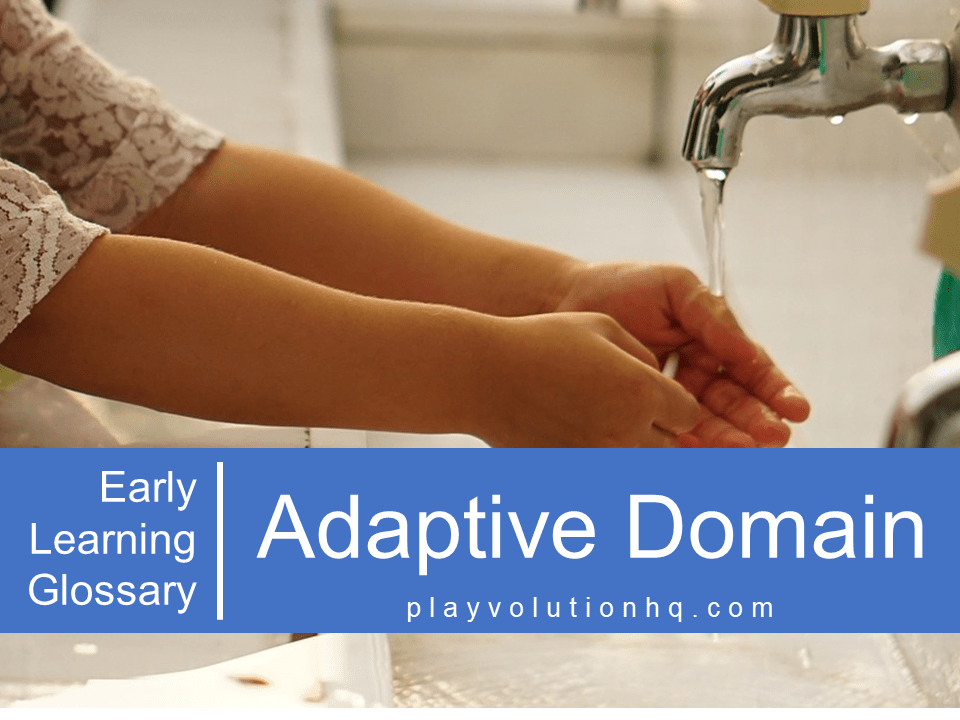
Table of Contents
The Adaptive Domain refers to skills and abilities that allow a child to adjust and function effectively in their environment. It encompasses a range of skills related to daily living, problem-solving, and social interaction, enabling a child to navigate and adapt to different situations and challenges. This domain encompasses the skills a child needs to navigate the world successfully.
Key Components Of The Adaptive Domain
The following are the major components of the adaptive domain:
- Daily Living Skills—These skills include tasks necessary for daily routines, such as dressing, eating, bathing, and personal hygiene. Mastery of these skills enhances a child’s independence and self-care abilities.
- Social Skills—Social adaptive skills involve interacting with others effectively, understanding social cues, sharing, taking turns, and cooperating in group settings. These skills are essential for forming relationships and participating in social activities.
- Communication Skills—Adaptive communication skills involve effectively expressing needs, thoughts, and emotions. This includes verbal and non-verbal communication, such as gestures, facial expressions, and understanding body language.
- Problem-Solving and Decision-Making—Adaptive problem-solving skills enable a child to identify challenges, generate solutions, and make decisions based on their understanding and assessment of situations. These skills promote cognitive development and self-confidence.

Developmental Milestones In The Adaptive Domain
Here are some developmental milestones in a child’s journey toward mastering skills in the adaptive domain:
- Infants start by developing basic self-regulation skills like feeding and sleeping patterns
- Toddlers begin to explore independence in tasks like dressing themselves or feeding with minimal assistance
- Preschoolers refine social skills through play and interaction with peers
- School-age children further develop problem-solving abilities through social and academic challenges
Supporting Adaptive Domain Development
Here are strategies and activities to promote adaptive development:
Encourage Independence
- Task Gradation—Break down tasks into smaller, manageable steps to build confidence and independence. For example, teach toddlers to put on their socks before attempting more complex dressing tasks.
- Choice-Making—Offer children choices to promote decision-making skills. For instance, allow a child to select which shirt they want to wear or which snack they prefer.
- Chores And Responsibilities—Assign age-appropriate chores like setting the table, tidying up toys, or feeding pets. Engaging in household tasks fosters a sense of responsibility and self-reliance.
Foster Social Interaction
- Playing With Peers—During play, children engage in cooperative activities like building blocks together or negotiating rules for a game.
- Role-Playing—Encourage role-playing scenarios that involve social interactions, such as pretending to be a shopkeeper or a customer, which promotes communication and negotiation skills.
- Emotional Regulation Activities—Help children recognize and manage emotions. Achieving this requires engaging in extensive real-world practice through interactions with peers, near peers, and adults, complemented by supportive discussion and guidance.
Model Effective Communication
- Narrative Skills—Encourage storytelling and imaginative play to develop language and narrative skills. Provide props and loose parts to enhance storytelling experiences.
- Active Listening—Practice active listening by giving children your full attention when communicating. Reflect on what they say to demonstrate understanding and encourage further conversation.
- Visual Supports—Use visual aids like picture schedules, calendars, or written lists to support understanding.
Provide Problem-Solving Opportunities
- STEM Activities—Engage children in STEM (Science, Technology, Engineering, and Math) activities such as building structures with blocks, solving puzzles, or conducting experiments.
- Creative Problem-Solving Challenges—Present open-ended challenges or riddles that require critical thinking and creative problem-solving skills. Encourage brainstorming and exploring multiple solutions.
- Outdoor Exploration— Spend time outside exploring nature or enjoying neighborhood adventures. Such outings encourage observation, inquiry, and problem-solving (e.g., identifying plants or animals or navigating a new neighborhood shop).
Sensory Exploration and Motor Skills Development
- Tactile Play—Provide sensory-rich experiences like playing with sand, water, or sensory bins filled with different textures to stimulate sensory exploration and fine motor skills.
- Gross Motor Activities—Encourage physical activities that develop gross motor skills, such as climbing, jumping, balancing, and playing sports.
- Fine Motor Practice—Offer children activities that improve hand strength and coordination, such as threading beads, using scissors, or drawing with different writing tools.

Adaptive Domain Wrap-up
In summary, the adaptive Domain is a vital aspect of child development, encompassing skills necessary for everyday functioning and social interaction. By incorporating the above ideas into daily life, early learning professionals and parents can create supportive environments that nurture the adaptive domain of child development.
Contribute content to Playvolution HQ
Brought to you by Explorations Early Learning
Thoughts On This Entry?
I’d love to hear your thoughts on improving this entry and suggestions for additional glossary additions in the comments below. You can also contact me with comments or concerns.
Browse Trainings
Post Author
Jeff Johnson is an early learning trainer, podcaster, and author who founded Explorations Early Learning, Playvolution HQ, and Play Haven.


Leave a Reply